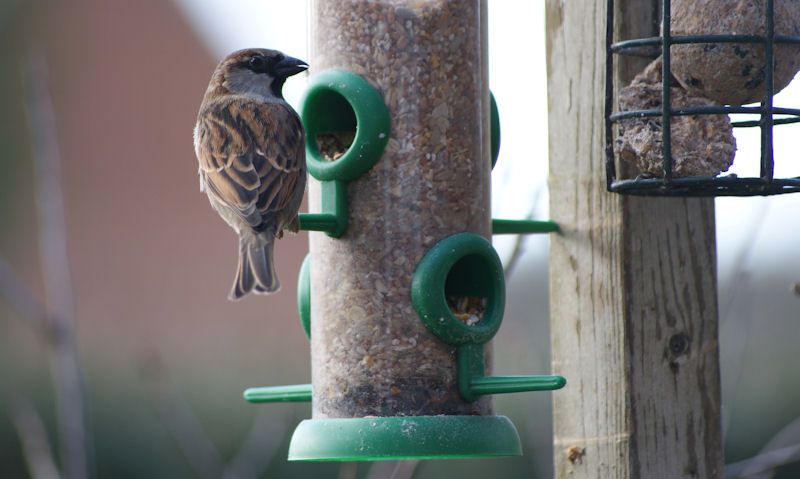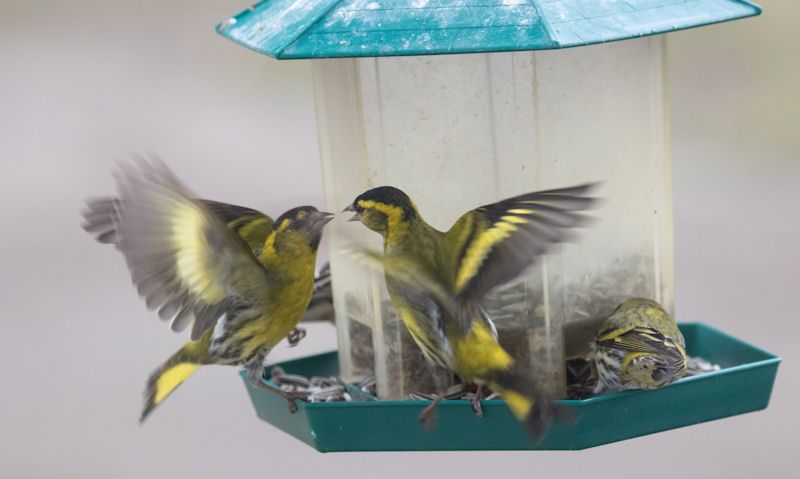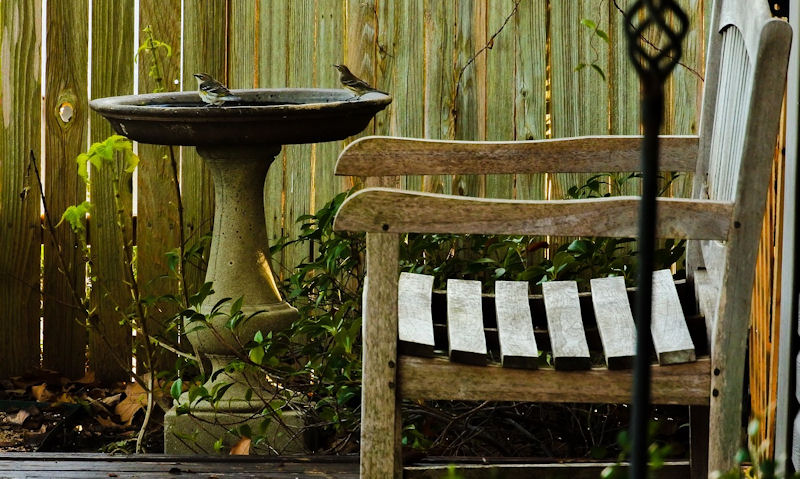How often to clean bird feeders
It can only be a good thing to clean bird feeders a couple of times a week, but in doing so can prevent the possibility of rot with bacteria growth.
How often should you clean bird feeders is every 7 days or less, but to do so more often is only going to benefit you. Clean feeders before replenishing with more fresh food, but do so before old bird food has been given time to congeal - thus making it hard to remove the stubborn build up of gunk later.
Keep your bird feeders hanging off the bird feeding station in top-notch condition by cleaning them as often as you possibly can.
How often to clean bird feeders can depend, but there's no good reason to not clean them at least once a week, but a couple of times a week is better.
To clean feeders more often is going to allow you to wash off soft, easier to remove build up inside the hard to reach interiors of bird feeders. Whereas, waiting too long to clean bird feeders can see this soft build up congeal into more hard to remove gunk.
Risk of bacteria growing inside the bird feeders can happen quickly, but to keep on top of a regular clean up is sure to avoid this occurring.
However, where a plastic or metal bird feeder is safe from rot, to clean wooden bird feeder or any type of bird table is more vital as timber is more prone to rot with a cause through dampness.
Maximum 7 days or less
When thinking about cleaning your bird feeders, doing so as regularly as possible is going to benefit you for one simple reason.
To clean a bird tube seed feeder or similarly, a mesh feeder designed to hold peanuts every 7 days or so - is going to prevent the build up of congealed bird feed that clogs up the interior of any feeder.
In allowing a bird feeder to go beyond this seven day period between a spring clean, can only see the leftover bird food contained inside get more and more difficult to remove.
Make life easy on you then when you do clean a bird feeder by doing so as often as you can, every 7 days - or far less if at all possible.
This way the bird food hasn't been given time to congeal, as to harden up inside a hard to access clear plastic tube bird feeder or metal mesh container is difficult as is - but worse still if you have to dig up food that's harden up in the corners.
Clean feeders to replenish
How often to clean bird feeders can be based on how often you replenish them, be it once or several times a week.
To clean the bird feeders before replenishing with fresh peanuts, seeds and the more difficult to clean suet feeders for fat balls, pellets or blocks - you can guarantee to kill any bacteria build up.
You may be able to get away by not cleaning the bird feeders so often in autumn through winter - but in spring through summer food expires far sooner under the heat of the sun.
So it would be best to clean bird feeders more often in the hot weather, as oppose to out in the cold, as feed tends to last longer.
I recommend then to clean your bird feeders of any type, just before filling them with food.
Its imperative there's no build up of bacteria or killer germs which can happen if you forget to clean the feeders before every refill.
Offer less food to clean up sooner
It can be you've left out so much bird food in a single large bird feeder, or worse still filled up too many bird feeders in one go - the feed can often expire before its all used up.
Trouble with that is as it expires the bird feed sitting in every bird feeder is going to rot inside the containers. Bacteria will build up with the potential of wild birds consuming it in large quantities.
How that happens under worst circumstances is lack of cleaning bird feeders as often of course - but that is attributed to waiting until its worth your time by allowing food to run dry.
Well, forget about going overboard on replenishing bird feeders with too much food, as its unlikely to be used up in a reasonable time.
Likewise, to use multiple bird feeders is still possible, but only use as many that's needed by understanding how much food gets eaten over course of a day, as to only fill each feeder to what is eaten in a short period.
Benefits to regular maintenance
Major benefits to regularly cleaning a bird feeder is to avoid the need to scrub the bird feeders in question with real hard work, every single time.
To dread cleaning your hanging bird feeders is a sure sign the you'd soon give up in doing so, but there's a trick to keeping you motivated.
Which is again, to clean the bird feeders as well has to clean bird tables as regularly as you possibly can.
To clean out feeders every week or so, you'd only then be washing out soft, easy to remove bird food, build up inside the feeders - thus avoiding long, hard work to remove the more hard, stubborn congealed leftovers.
Clean and maintain the bird feeders as often as you can then to avoid making hard work of it later.
To clean feeders more often, the softer, loose bird food crumbs or leftover seeds or nuts will simply fall out - so a soapy bath is quicker with little to no scrubbing out the feeders.
Damage to bird feeders a possibility
Make no mistake, bird feeders while left out in the garden for 365 days in the year is going to see wear and tear in due course.
However, providing the integrity of the bird feeders are sound, you can continue to use them just as you did when it was brand new.
Now, to not clean bird feeders often can see damage done to the bird feeder interior.
It could be a build up of bird feed that can never be removed as you left it too long, so the interior won't be something nice to look at.
But where there's a build up of bird food that can never be removed, is the possibility of rot settling into the material of the bird feeders.
It can be seen less in made in metal or plastic bird feeders, but there is serious problem with damp as rot begins to seep in to wooden bird feeders gain or open cracks.
Do NOT allow feed to run out
How often you decide to clean your bird feeders is up to you of course, but in doing so you must never allow bird feeders to run out of food.
Its imperative you come to your bird feeders to clean them when there's still bird food to be had - but don't wait until its run out as the food can go rotten in this time.
Birds come to depend on bird feeders so rely upon you to replenish them regularly, as to keep them healthy so they can come back for years to come.
So to not replenish often as you can can see birds go elsewhere, so before you know it your regular garden birds will forget all about your bird feeder setup.
Use that then as a motivation too continue to clean your bird feeders as often as you can, as to replenish them with fresh, healthy bird food.
Do not allow bird feed to run out, as there could be implications of birds deciding to go elsewhere, but in the time it takes to clean out a bird feeder - you'd soon have them up and running again in no time.
To summarise
Maximum seven days is how often to clean bird feeders of any kind, but to do it more often is highly recommended.
What can happen if putting off a regular spring clean of bird feeders is the leftover bird feed begins to congeal; it hardens up so much its difficult to remove, so is often left there to build up - as access to the interior of feeders is restricted.
To clean bird feeders every week or so, you'd avoid the bird food hardening up in the feeders, so you can then more easily wash them out with little fuss.
Never remove used bird food to replace it again once the feeder has been clean. Its important to only clean a bird feeder before replenishing with fresh bird food only.
To allow bird feed to rot inside a feeder, thus allowing bacteria to grow - is only going to be ingested by a mix of wild birds, to then make them poorly.
What you must do then is use less bird food so there's less waste. Never wait until bird feed as run out before cleaning them, but to use less food should motivate you to clean the feeders more often - to replenish with seeds, peanuts and suet.


